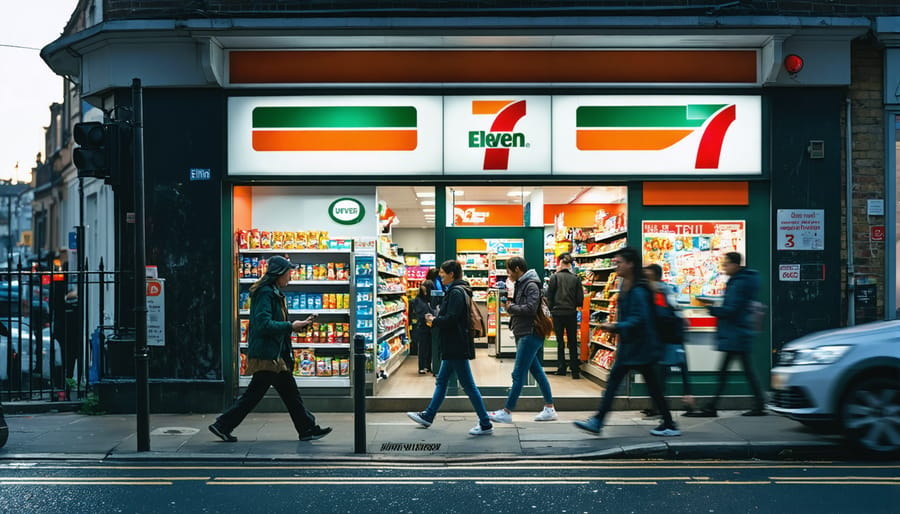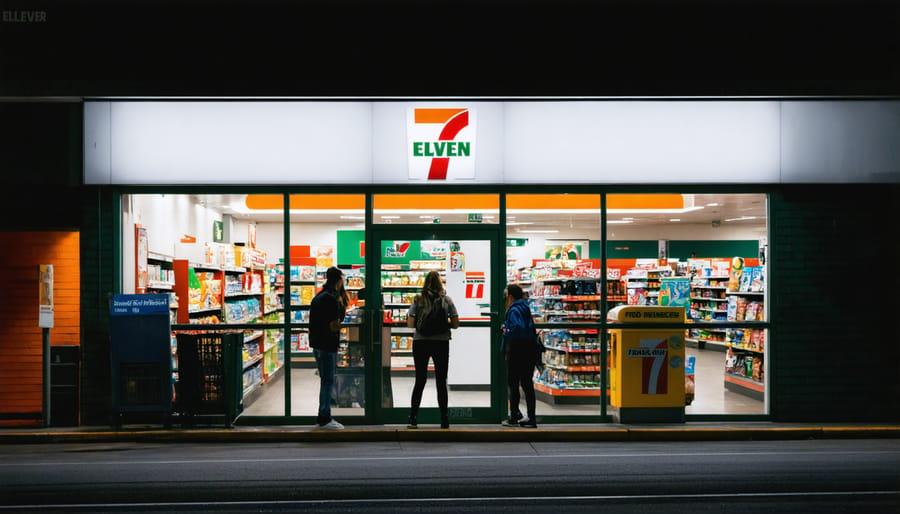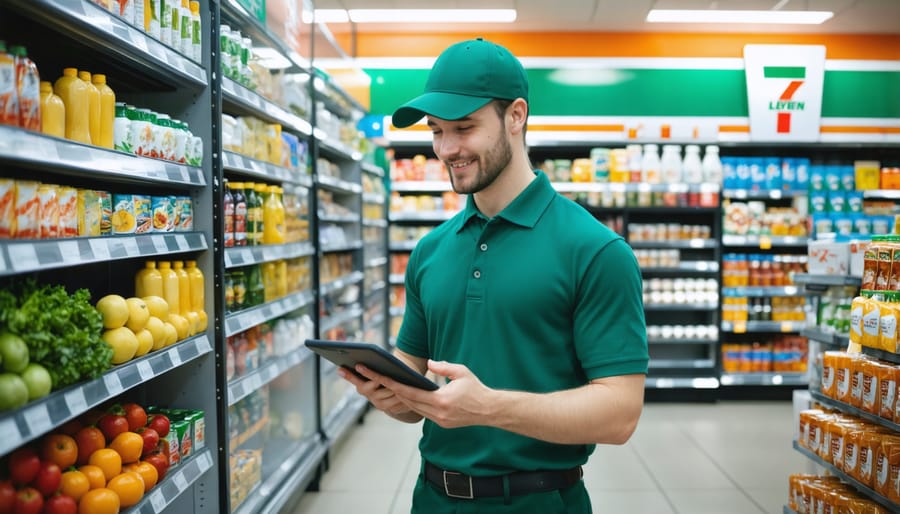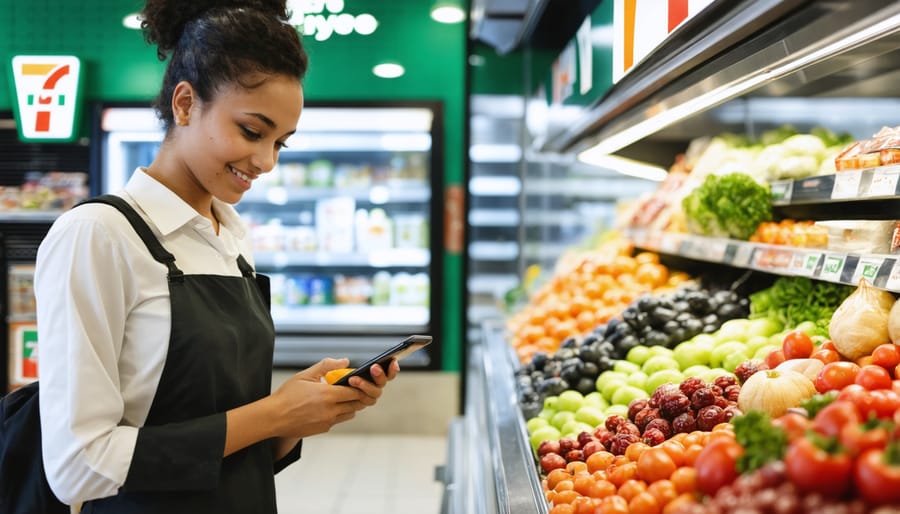
From corner store to global retail powerhouse, 7-Eleven’s revolutionary business model has redefined convenience retail for over nine decades. By pioneering the franchise system and mastering the art of convenience, this retail giant has grown from a single ice house in Dallas to over 77,000 stores worldwide. The success story of 7-Eleven isn’t just about selling Slurpees and snacks – it’s a masterclass in location strategy, inventory management, and customer-centric innovation. Whether you’re a budding entrepreneur looking to understand franchise operations or a business enthusiast curious about retail success stories, 7-Eleven’s model offers valuable insights into how adaptability, convenience, and strategic partnerships can create a lasting competitive advantage. Let’s explore the key elements that transformed a simple ice-selling business into one of the world’s most recognized retail brands, and discover how these principles can inspire your own business journey.
The Convenience Revolution: 7-Eleven’s Core Business Principles
Location Strategy
Ever noticed how there seems to be a 7-Eleven just around every corner? That’s no coincidence! The convenience store giant has mastered the art of strategic location planning, making their stores incredibly accessible to customers wherever they go.
Picture this: you’re rushing home from work, need to grab a quick snack, and there’s a 7-Eleven right on your route. That’s exactly what they aim for! The company specifically targets high-traffic areas, busy street corners, and densely populated neighborhoods. They also love setting up shop near office buildings, residential areas, and public transportation hubs – basically anywhere people naturally flow throughout their day.
What I find fascinating is how they adapt their store locations to different environments. In urban areas, you’ll find 7-Elevens within walking distance of each other, while in suburban locations, they’re strategically placed along major commuter routes. They even consider factors like parking availability and local competition when choosing new locations.
The brand’s location strategy isn’t just about being everywhere – it’s about being exactly where their customers need them, when they need them. This accessibility has become such a crucial part of their success that many people now associate convenience store shopping with 7-Eleven.

Product Mix Innovation
Have you ever noticed how 7-Eleven seems to know exactly what you need, when you need it? Their product mix strategy is like having a thoughtful friend who keeps both everyday essentials and fun surprises on hand. The convenience store giant has mastered the art of balancing must-have items with trendy products that keep customers coming back for more.
Walking into any 7-Eleven, you’ll find the basics – milk, bread, and household necessities – perfectly positioned alongside seasonal items and the latest food trends. Remember when bubble tea became a thing? 7-Eleven was right there with their own version! They’re constantly refreshing their inventory to include products that reflect current lifestyle trends while maintaining their core offerings.
What’s particularly clever is how they adapt their product mix to local preferences. Your neighborhood 7-Eleven might carry different items than one across town, based on what local customers typically buy. They also leverage data analytics to predict shopping patterns and adjust their inventory accordingly. This smart approach ensures they’re not just a convenience store, but a reliable destination for both daily necessities and those little treats that make our busy days a bit brighter.
Smart Inventory Management Lessons
Just-in-Time Delivery
Have you ever wondered how 7-Eleven keeps those delicious sandwiches and onigiri so fresh? Their just-in-time delivery system is like having a carefully choreographed dance between suppliers, stores, and customers. As a frequent visitor to my local 7-Eleven during lunch breaks, I’ve noticed their shelves are consistently stocked with fresh items throughout the day.
The secret lies in their sophisticated inventory management system, which tracks sales patterns and customer preferences in real-time. This allows them to predict exactly when and what products need restocking, ensuring food items arrive just before they’re needed. Most stores receive multiple deliveries daily, with some popular locations getting up to three deliveries per day!
What’s particularly impressive is how this system reduces food waste while maintaining quality. Items like rice balls, sandwiches, and salads are prepared fresh and delivered within tight timeframes. The store’s computer system automatically alerts distribution centers when stock runs low, and deliveries are scheduled during off-peak hours to ensure smooth operations.
This precise timing isn’t just about keeping things fresh – it’s also about minimizing storage needs and reducing costs, making those convenience store runs both reliable and affordable for busy shoppers like us.
Data-Driven Decisions
Ever wonder how 7-Eleven seems to know exactly what you need before you do? It’s not magic – it’s smart data! The convenience store giant has mastered the art of using customer insights to stock their shelves with products we actually want. Just like how we check our fitness apps to track our daily steps, 7-Eleven monitors shopping patterns through their loyalty program and point-of-sale systems.
I remember walking into a 7-Eleven on a hot summer day and finding my favorite coconut water perfectly chilled – that’s no coincidence! The store tracks everything from purchase times to weather patterns, helping them predict what customers want and when they want it. They even adjust their product mix based on neighborhood demographics and local preferences.
What’s really fascinating is how they use this data to support small business owners who run individual stores. Store operators receive regular updates about trending products and shopping patterns in their area, allowing them to make smart inventory decisions. This approach has been particularly successful in helping stores adapt to changing customer needs, especially during events like seasonal changes or local celebrations.
By letting data guide their decisions, 7-Eleven maintains its position as everyone’s favorite neighborhood convenience store while maximizing sales and reducing waste.

Franchise Success Secrets
At the heart of 7-Eleven’s remarkable franchise model success lies a carefully crafted support system that empowers entrepreneurs to thrive. As someone who’s spent countless coffee runs chatting with local 7-Eleven franchisees, I’ve discovered that their secret sauce isn’t just about selling Slurpees – it’s about creating a partnership that works.
The company provides comprehensive training programs that cover everything from inventory management to customer service excellence. Think of it as having a business bestie who’s been there, done that, and is ready to share all their wisdom. New franchisees receive up to 8 weeks of intensive training, ensuring they’re fully prepared before opening their doors.
What really sets 7-Eleven apart is their proprietary retail information system. This tech-savvy tool helps franchisees make smart decisions about inventory, pricing, and promotions based on real-time data. It’s like having a personal business analyst working around the clock!
The support doesn’t stop there. 7-Eleven offers ongoing operational assistance, marketing support, and access to their powerful supply chain network. They’ve mastered the art of combining local market knowledge with global resources, allowing franchisees to focus on what matters most – building relationships with their customers and growing their business.
Perhaps most importantly, 7-Eleven understands that success is a two-way street. They actively seek feedback from franchisees and adapt their strategies based on real-world experiences. This collaborative approach has created a community of successful entrepreneurs who share best practices and support each other’s growth.
Modern Adaptations for Today’s Market
Digital Integration
In today’s fast-paced world, 7-Eleven has embraced digital transformation strategies to stay ahead of the curve. Their mobile app has become a game-changer, offering customers a seamless shopping experience with features like mobile payments, loyalty rewards, and exclusive deals. As a busy mom myself, I love how the app lets me skip the line during my morning coffee run!
The convenience store giant has also partnered with popular delivery services like DoorDash and Uber Eats, making their products accessible 24/7 without leaving home. This has been particularly valuable for those late-night cravings or when juggling work and family responsibilities.
Digital payment solutions have become a cornerstone of 7-Eleven’s modern approach. From contactless payments to mobile wallets and even cryptocurrency at select locations, they’re making transactions effortless for tech-savvy customers. The integration of digital payment methods has not only improved customer convenience but also helped streamline operations and gather valuable consumer data.
What’s particularly impressive is how 7-Eleven has maintained its neighborhood store feel while embracing these digital innovations, creating a perfect blend of traditional convenience and modern technology.

Health-Conscious Options
Gone are the days when convenience stores were solely associated with hot dogs and sugary slushies. 7-Eleven has masterfully evolved its offerings to cater to today’s health-conscious consumers, proving that convenience and wellness can go hand in hand.
Walking into a modern 7-Eleven, you’ll find fresh salads, protein boxes, and cut fruit alongside traditional convenience fare. I recently discovered their selection of pressed juices and was pleasantly surprised by the quality and variety. The chain has introduced organic options, plant-based snacks, and low-calorie meals that appeal to busy professionals and health-minded parents alike.
This strategic shift reflects a deep understanding of changing consumer preferences. By partnering with local suppliers and implementing strict freshness standards, 7-Eleven ensures their healthy options maintain the same convenience factor their customers expect. They’ve even introduced fresh food delivery services in many markets, making nutritious choices accessible at the tap of an app.
The addition of healthier alternatives hasn’t just been good for customers – it’s been fantastic for business. These premium offerings often carry higher profit margins while attracting a new demographic of health-conscious shoppers who might have previously overlooked convenience stores for their daily needs.
The remarkable success of 7-Eleven’s business model offers valuable lessons for aspiring entrepreneurs and business owners. From its innovative franchise system to its data-driven approach to inventory management, 7-Eleven has proven that convenience and adaptability are key to thriving in today’s fast-paced retail landscape.
As a female entrepreneur myself, I’ve found inspiration in how 7-Eleven consistently evolves to meet changing consumer needs while maintaining its core identity. Whether it’s embracing digital transformation through mobile payments or responding to health-conscious consumers with fresher food options, their willingness to innovate while staying true to their convenience-first philosophy is truly admirable.
The key takeaways from 7-Eleven’s model can be applied to businesses of any size: focus on customer convenience, leverage data for decision-making, maintain strong supplier relationships, and always be ready to adapt to changing market conditions. Remember, success often lies in finding the perfect balance between consistency and innovation – something 7-Eleven has masterfully achieved over the decades.
As you consider your own business journey, think about how you can incorporate these principles while adding your unique touch to create something truly special.



